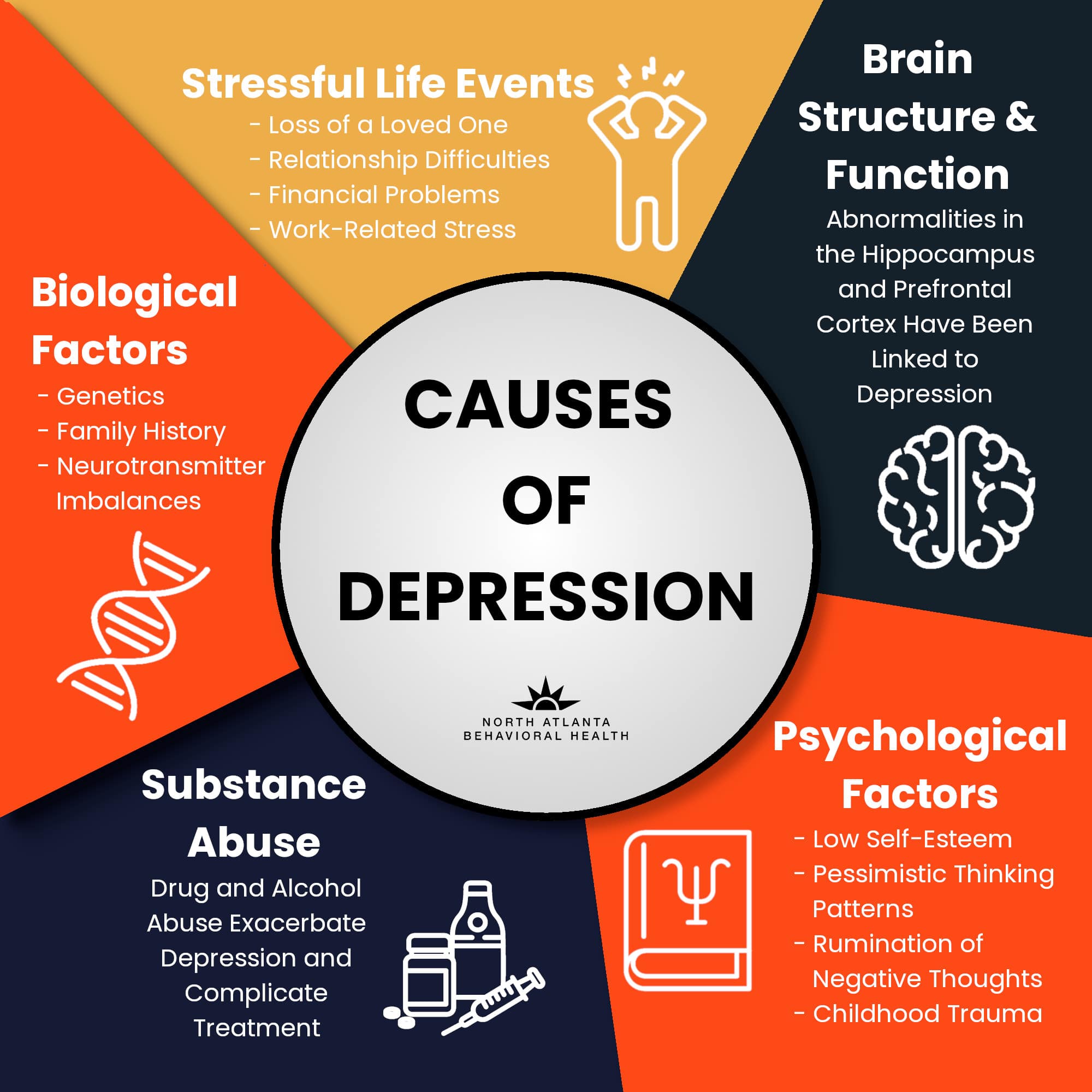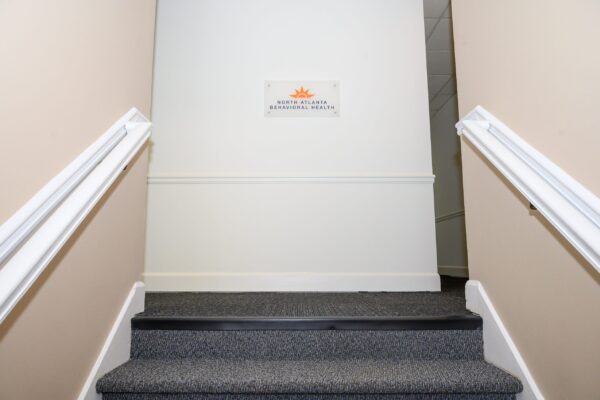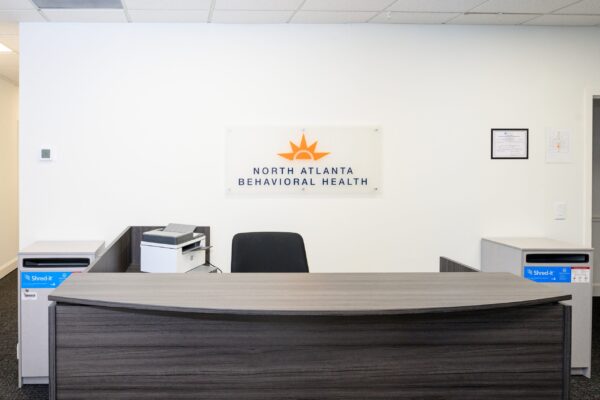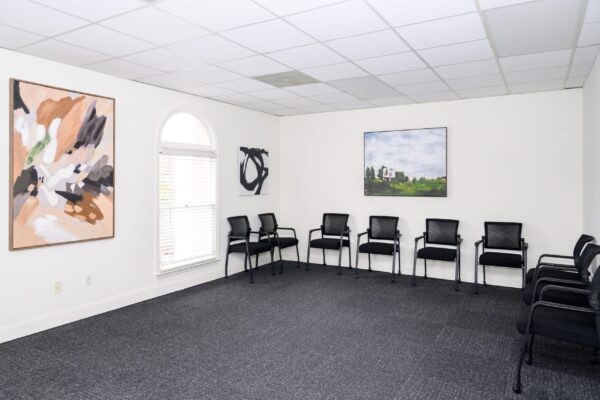Depressive disorder, also known as depression, is a common mental health disorder that affects an estimated 280 million individuals worldwide. Depression, which involves depressed mood, loss of interest or pleasure in activities, and decreased energy levels, is different from standard and short-lived feelings of sadness. Those who suffer from depression typically experience a reduced quality of life unless their symptoms are professionally treated.
At North Atlanta Behavioral Health, we recognize the profound impact depression can have on individuals and their loved ones. Our dedicated team is committed to providing compassionate and effective mental health and depression treatment in Atlanta, offering a path toward healing and recovery.
If your or a loved one is struggling with depression, call us today at 770-230-5699 or verify your insurance now.
What is Depression?
Depression is a common but serious mood disorder that affects how a person feels, thinks, and handles daily activities. It is characterized by persistent sadness, hopelessness, and a lack of interest or pleasure in previously enjoyed activities. These symptoms must be present for at least two weeks for a diagnosis of depression.
The mental health disorder is more than just a case of the blues, and it is not something that can be easily shaken off. Depression can interfere with work, school, relationships, and daily tasks. It can also manifest physically, causing changes in appetite, sleep disturbances, fatigue, and physical pain. Depression treatment in Atlanta focuses on understanding this complexity and offering comprehensive care.
The Biology of Depression
Biologically, depression is associated with changes in brain structure and chemistry. Neurotransmitters, the chemicals in the brain that transmit signals between neurons, play a significant role. Serotonin, norepinephrine, and dopamine are particularly important in mood regulation, and imbalances in these neurotransmitters are often found in people with depression.
Neuroimaging studies have shown that the brains of people with depression can look different. For example, the hippocampus, a region associated with memory and emotion, tends to be smaller in some depressed individuals. This size reduction is thought to result from cortisol exposure, a hormone released during prolonged stress
Signs and Symptoms Someone May Need Depression Treatment
Recognizing the signs and symptoms that indicate a need for depression treatment is essential for early intervention. Persistent sadness and a profound loss of interest in once-enjoyable activities are primary indicators. Individuals experiencing changes in appetite, weight, sleep patterns, and energy levels should also consider seeking help.
Common symptoms of depression include:
- Persistent feelings of sadness, hopelessness, or emptiness
- Loss of interest or pleasure in activities once enjoyed
- Changes in appetite — significant weight loss or gain unrelated to dieting
- Sleep disturbances — either insomnia or sleeping too much
- Fatigue or decreased energy levels
- Feelings of worthlessness or excessive or inappropriate guilt
- Difficulty thinking, concentrating, or making decisions
- Irritability or restlessness
- Physical symptoms that are not explained by another medical condition (e.g., aches or pains, headaches, cramps)
- Recurrent thoughts of death or suicide, suicide attempts, or suicide planning
At North Atlanta Behavioral Health, we offer depression treatment in Atlanta to address these symptoms and provide practical strategies for recovery and mental well-being.

What Causes Depression?
Depression is a complex mental health condition influenced by a combination of factors. While its exact cause may vary from person to person, several contributors are commonly associated with the development of depression.
- Biological Factors: Genetics plays a significant role in depression. Individuals with a family history of depression are at a higher risk. Changes in brain chemistry, particularly neurotransmitter imbalances, can also contribute to its onset.
- Life Events: Stressful life events, such as the loss of a loved one, relationship difficulties, financial problems, or work-related stress, can trigger depressive episodes. These events may overwhelm an individual’s coping mechanisms.
- Brain Structure and Function: Structural and functional abnormalities in the brain, such as the hippocampus and prefrontal cortex, have been linked to depression. These areas regulate mood, emotions, and cognitive functions.
- Psychological Factors: Low self-esteem, pessimistic thinking patterns, and a tendency to ruminate on negative thoughts can increase the risk of depression. Psychological trauma and childhood experiences may also contribute.
- Substance Abuse: The misuse of drugs or alcohol can exacerbate or trigger depressive episodes. Substance abuse can also complicate the treatment process.
Each experience with depression is unique, making it essential to address individual needs in depression treatment. At North Atlanta Behavioral Health, our approach to depression treatment in Atlanta takes into account these various factors to provide comprehensive and tailored care for each individual seeking help.

What to Expect at North Atlanta Behavioral Health
When seeking treatment for depression at North Atlanta Behavioral Health, you can expect a comprehensive and compassionate and evidence-based approach. We offer a supportive environment with a team of experienced professionals, including therapists, psychiatrists, and other mental health specialists.
Upon arrival, clients undergo an initial assessment to determine the most appropriate level of care, whether it is PHP, IOP, or standard OP. The treatment plan is then tailored to specific needs, incorporating a range of therapies and techniques. These may include cognitive behavioral therapy, medication management, group therapy, and holistic approaches. Clients are actively involved in their treatment planning and progress evaluation, ensuring a personalized experience.
Our Depression Treatment Options
North Atlanta Behavioral Health offers several treatment options for depression, focusing on varying levels of care tailored to individual needs. Our programs include Partial Hospitalization Programs (PHP), Intensive Outpatient Programs (IOP), and standard Outpatient Programs (OP).
Each of our mental health treatment programs incorporates a holistic approach to treatment, considering the individual’s physical, mental, and emotional health. The therapies and services are evidence-based and tailored to meet each client’s unique needs and goals. The focus is on providing comprehensive care that addresses not just the symptoms but the underlying causes of mental health issues.
Partial Hospitalization Program (PHP)
This is the most intensive form of outpatient treatment North Atlanta Behavioral Health provides. PHP programs are typically a step down from residential treatment or can be an entry point based on clinical needs. The PHP includes daily group sessions, individual therapy, case management, medication management, and more. It’s designed for individuals who need substantial support and treatment during the day but can return home in the evening.
Intensive Outpatient Programs (IOP)
Daytime or evening IOP at North Atlanta Behavioral Health is less intensive than PHP but offers a concentrated treatment. It’s suitable for individuals who do not require residential care but need significant weekly time for recovery. The IOP program includes group counseling, individual therapy, psychoeducation, skills-building workshops, and holistic therapies. IOP allows clients to continue their daily commitments while receiving treatment, with sessions available during the daytime and evening.
Outpatient Rehab Programs (OP)
Standard outpatient rehab is the least intensive level, offering flexibility and a range of therapies. This includes individual and group counseling, psychiatric care, medication management, and education on mental health and addiction. The frequency and duration of the sessions in OP are typically less than PHP and IOP, allowing individuals to manage their daily lives and responsibilities while receiving care.
How Long Does Depression Treatment Last?
The duration of depression treatment at North Atlanta Behavioral Health varies depending on the severity of the condition. For PHP and IOP, the length of treatment typically ranges from a few weeks to several months. PHP often involves daily sessions for a more extended period, while IOP may require attendance several times a week.
Standard OP treatment can last longer but with less frequent sessions. Recovery from depression is a personal journey, and treatment duration is adjusted accordingly to ensure the best possible outcomes. Ongoing support and follow-up care are also essential components of the treatment process to maintain progress and manage future challenges.

By NABH Staff
Medically Reviewed by
Erika Dalton, LMSW.
Last Updated on March 18, 2024
Get Help Now
Begin Depression Treatment in Atlanta Today
Mental health disorders cannot be treated by treating the symptoms alone. We use holistic and evidence-based methods to treat the entire individual.
Facility Image Gallery
Begin Depression Treatment in Atlanta Today
If you or a loved one is struggling with depression, exploring treatment options can be a critical step towards healing. Our commitment to evidence-based, holistic approaches ensures that each client receives the care they need to address not just the symptoms of depression but also its root causes.
With a focus on individual needs and continuous support, North Atlanta Behavioral Health stands as a valuable resource for those seeking help in overcoming depression and improving their mental health. For more information or to start the journey toward recovery, contact North Atlanta Behavioral Health today.













 I have been to my fair share of mental health programs and this one was extremely small, intimate and every staff member I have ever had contact with has been completely professional, compassionate, and caring.
I have been to my fair share of mental health programs and this one was extremely small, intimate and every staff member I have ever had contact with has been completely professional, compassionate, and caring.










